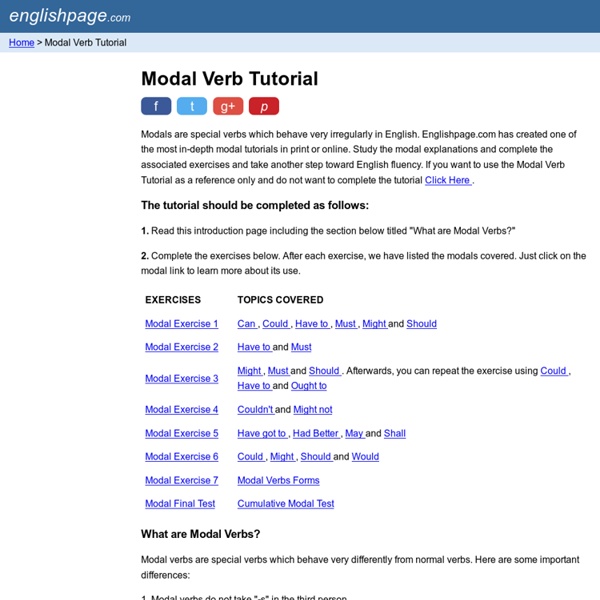Modal Verb Tutorial
Modals are special verbs which behave very irregularly in English. Englishpage.com has created one of the most in-depth modal tutorials in print or online. Study the modal explanations and complete the associated exercises and take another step toward English fluency. If you want to use the Modal Verb Tutorial as a reference only and do not want to complete the tutorial Click Here . The tutorial should be completed as follows: 1. 2. What are Modal Verbs? Modal verbs are special verbs which behave very differently from normal verbs. 1. Examples: He can speak Chinese. 2. He should not be late. 3. He will can go with us. Common Modal Verbs For the purposes of this tutorial, we have included some expressions which are not modal verbs including had better, have to, and have got to. Your personal online English school.
Modal Verbs Exercise 1
1. Ted's flight from Amsterdam took more than 11 hours. He be exhausted after such a long flight. He prefer to stay in tonight and get some rest. 2. 3. 4. 5. 6. 7. 8. 9. 10. 11. 12. we pull over at the next rest stop? 13. 14. 15. 16. 17. 18. 19. you always say the first thing that pops into your head? 20.
Little Bird Tales - Home
So / Such
The following is a mini-tutorial on the use of "so" and "such." After you have studied the tutorial, complete the associated exercises. If you already know how to use "so" and "such," you can skip the explanation and go directly to the exercises. So + Adjective "So" can be combined with adjectives to show extremes. Examples: The music is so loud! USE with "That" The above form can be combined with "that" to show extremes which lead to certain results. The music is so loud that I can't sleep. So + Adverb "So" can be combined with adverbs to show extreme actions. She spoke so quickly! The above form can be combined with "that" to show extreme actions which lead to certain results. She spoke so quickly that I couldn't understand her. So + Many / Few + Plural Noun "So" can be combined with "many" or "few" plus a plural noun to show extremes in amount. I never knew you had so many brothers! The above form can be combined with "that" to show extremes in amount which lead to certain results.
Modals of Polite Request
These four questions are made with modal verbs: Would you... ? Could you... ? Will you... ? Can you... ? Modal verbs are helping/auxiliary verbs that express ideas like ability, permission, and asking for assistance. For example: Could you help me for a minute, please? This shows that the speaker is asking for help politely. To ask questions in a very polite way, use: Would you/ Could you (please) + simple verb + ...? Would you please email that document to me? Could you explain that again, please? *ASAP = as soon as possible To ask questions in a polite but more casual way, say: Will you/ Can you (please) + simple verb + ...? Will you please answer the phone? Can you hold my books for me? We do not use the word “may” in a polite question when “you” is the subject. May you please close the door? Wrong! Could you please close the door? Right! The word “please” makes the request more polite and less direct. Possible positive answers to the questions above: Informally, we can say: Sure. No.
Debate Forum | Online Debate Community | CreateDebate
dog :: Lexipedia
dog n. informal term for a man; "you lucky dog" n. a member of the genus Canis (probably descended from the common wolf) that has been domesticated by man since prehistoric times; occurs in many breeds; "the dog barked all night" frump, dog n. a dull unattractive unpleasant girl or woman; "she got a reputation as a frump"; "she's a real dog" pawl, detent, click, dog n. a hinged catch that fits into a notch of a ratchet to move a wheel forward or prevent it from moving backward dog, domestic dog, Canis familiaris There are no items for this category follow v. to travel behind, go after, come after; "The ducklings followed their mother around the pond"; "Please follow the guide through the museum" evict, force out v. expel from one's property or force to move out by a legal process; "The landlord evicted the tenants after they had not paid the rent for four months" oust v. remove and replace; "The word processor has ousted the typewriter" drive herd
Games for Learning English, Vocabulary, Grammar Games, Activities, ESL
VoiceGem - Simple Voice Messaging
Related:
Related:



